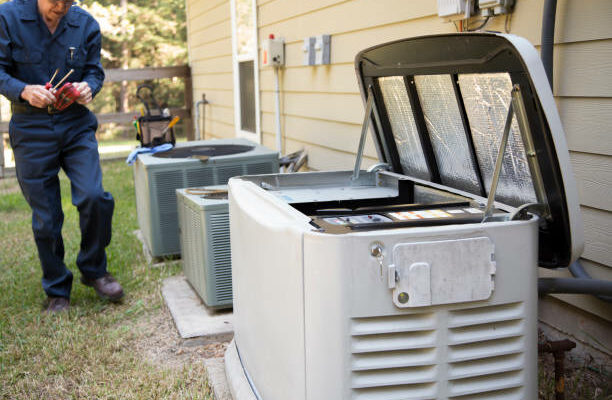When Hurricane Sandy hit the East Coast in 2012, many saw the devastation it left behind and wondered how to prepare for the next time mother nature decided to strike.
Although you can’t predict when a severe weather event will occur, you can protect your families by making sure they have access to the necessities during this time, such as power or electricity.
In such events, a generator would greatly help. It responds to the need for an uninterrupted power supply daily and from moment to moment.
Generators keep the power flowing even when there is a power outage in your neighborhood or even if an enormous natural disaster strikes.
So, when deciding to get a home generator, you want to find the right one for your needs and budget.
People often think it’s easy to choose a generator, but there are many options, so it’s hard to know which one will work best for you.
This article includes tips on how to find the right generator for you. In addition, to help keep your investment running smoothly, this article contains a few tips on a proper home generator installation process so you can power up quickly and safer should the need arise.
What Size Generator Do You Need?
The answer depends on how much power your home uses and how long you want it to run without refueling.
Thus, ensuring that your generator can handle all your household appliances at once is essential.
This includes air conditioners, refrigerators, freezers, and other significant machines that draw lots of power when running at maximum capacity.
You should also remember if you have medical devices such as CPAP machines, dialysis machines, or similar. These will also require their dedicated circuits or generators can be wired up in parallel.
Ideally, you should have enough circuits for each device plus one additional circuit for backup purposes.
If you want peace of mind during occasional blackouts, look for a backup generator that can run for at least 8 hours.
For extended power outages or bigger jobs like construction projects, choose an emergency generator that can run for 24 hours.
A too-big generator will not run efficiently and waste fuel; one that is too small won’t be able to power your entire home during an outage.
You can find out what size generator you need by consulting a professional. They can properly size your generator for your needs.
Where Should a Generator Be Placed?
Where you place your generator is critical to its performance. You want it to be in a clear space. Please don’t put it too close to areas where falling debris might damage the unit. So place it away from trees or other tall objects that could topple over in bad weather.
You also want it to be at least 20 feet away from any fuel source, like a garage or shed, where gas can leak into the air.
Don’t put the unit in an enclosed space like a garage; your house could explode if the fuel tank ruptures during a storm.
If you plan on putting it outside, the best place for a backup generator is in an open area away from structures such as garages or sheds.
It’s also vital that the generator is level and stable. If it’s leaning over on one side, it could tip over during use and cause injury.
How Do You Install A Home Generator?
Once you’ve found the generator you want, you’re ready to install it.
However, it’s worth noting that most communities require homeowners who install generators within city limits to get permits before constructing their property.
This ensures that you meet all safety standards before installation starts so that no one gets hurt when using the new generator system.
Steps:
First of all, ensure you have enough room for the unit. You don’t want to install a generator and find out it doesn’t fit in your selected space. Make sure to always think of the following:
- Install the generator at least a few feet from all windows and doors.
- Set the generator above a pre-cast concrete pad supported by a compacted gravel bed.
- Secure the generator using four stainless-steel bolts.
- Have a plumber connect a natural gas line to the generator.
Secondly, make sure that your power source is sufficient for the device. If you are installing a portable generator, this isn’t an issue as long as you have enough power ports in your house.
However, if you are installing a permanent backup system, you will likely need to upgrade your wiring or add new circuits to accommodate the additional load of the generator. Also, consider the following when working with the connections:
- Have an electrician conduct a line-voltage cable to the generator.
- The generator tests itself automatically by turning it on every two weeks. You have to run for about 20 minutes.
- The homeowner and electrician will receive a diagnostic signal every time the generator kicks on.
- A transfer switch is located close to the electrical meter. It sends electricity into the house when the power goes out and the generator kicks on.
Thirdly, remember that generators are loud. So don’t install them too close to bedrooms or living areas where people spend most of their time.
Fourthly, ensure adequate ventilation for indoor and outdoor units so they don’t overheat or emit harmful fumes into your home or yard during use.
Finally, remember that generators need regular maintenance just like any other piece of equipment would need regular care and maintenance, including oil changes and tune-ups now and then, depending on whether or not you use it regularly.
How do you run a generator safely?
You first need to know that you are not supposed to leave generators running for long periods. Only use them when there is a power failure.
If you leave your generator on, it will burn up, and you’ll have to replace it. So always keep the generator off when it’s not needed.
Use a timer with your generator box to control when it turns on and off. This will save wear and tear on your generator and extend its life. Set the timer so it doesn’t turn on until after all your appliances are off at night.
Ensure that everyone in your household knows how to use the generator properly. This includes what buttons to push and how to start the process safely.
What is the best home generator brand?
A lot of people have asked this question, but it’s a difficult one to answer. As you might imagine, many different brands exist, and they all have advantages and disadvantages. However, we’re here to help you pick the right generator for your needs.
The first thing you should do before buying any generator is to ensure it’s suitable for your house or apartment. You don’t want to buy something that won’t fit in the space you have available for it.
Also, if you live in an apartment building or condo complex, ensure a generator is even allowed.
Once you know what size generator will work best for your situation, it’s time to look at brands. Hundreds of brands are out there, each with unique benefits and drawbacks.
The best home generator brand is one that suits your needs. Generators are very different, and there’s no “best” per se. It all depends on what you need it for and how much money you want to spend.
Final Thoughts
A generator can be a great way to keep your home running during an outage.
They provide safety and security, especially during times when you need to have power for your home. But having a generator can be more than just a luxury. It is also an investment that will protect your property and loved ones.
But getting an emergency generator can save your life if you live where storms and other natural disasters are common.




Comments